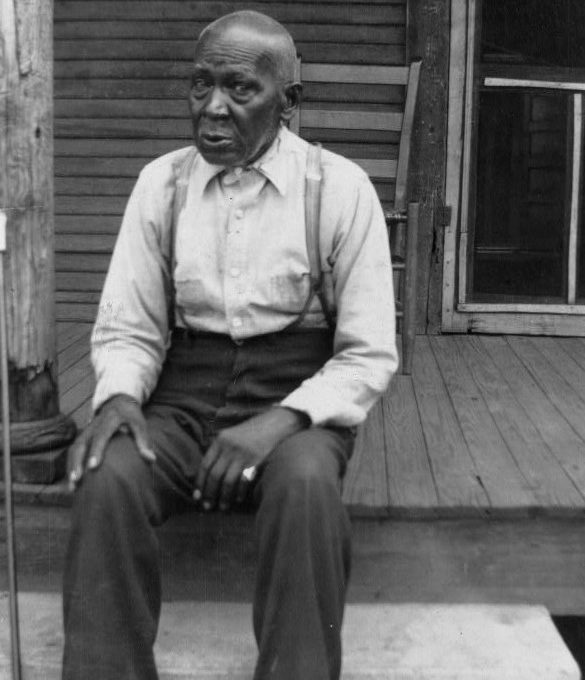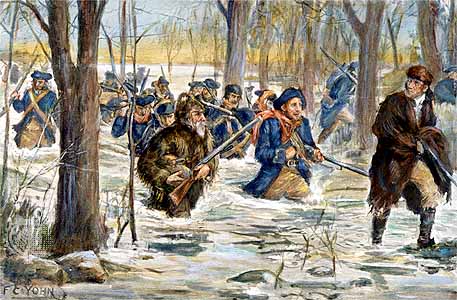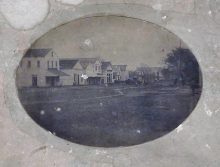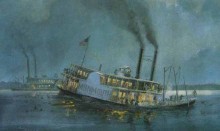Former Patron story – (WARNING! This WPA interviewer made an attempt in this interview to capture the dialect of this former slave and may be offensive to readers today. We have transcribed the words exactly as written. Please consider the time and culture of the day and do not read if you are offended.)
W.P.A.
Alabama Writers Project
Life Histories/Stories
By
W. F. Jordan
(Transcribed exactly as written in 1937)
OLE JOE HAD REAL ‘LIGION
Walter Calloway lives alone half a block off Avenue F, the thoroughfare on the southside of Birmingham on which live many of the leaders in the Negro life of the city. For his eighty-nine years he was apparently vigorous except for temporary illness. A glance at the interior of his cabin disclosed the fact that it was scrupulously neat and quite orderly in arrangement, a characteristic of a great many ex-slaves. As he sat in the sunshine on his tiny front porch, his greeting was: “Come in, white folks. You ain’t no doctor is you?”
To a negative reply, he explained as he continued, “Fo’ de las’ past twenty-five years I been keepin’ right on, wukkin’ for de city in de street department. ‘Bout two mont’s ago dis mis’ry attackted me an’ don’t pear lak nothin’ dem doctores gimme do no good., De preacher, he come to see me dis mornin’ an’ he say he know a white gemman doctor, what he gwine to sen’ him to see me. I sho’ wants to git well ag’in pow’ful bad, but mebby I done live long ’nuff an’ my time ’bout come.”
Quizzed about his age and antecedents, he began his story:
“Well, Sir, Cap’n, I was born in Richmond, Virginny, in 1848. Befo’ I was ole ’nuff to ‘member much, my mammy wid me an’ my older brudder was sold to Marse John Calloway at Snowdoun in Montgomery county, ten miles south of de town of Montgomery.
“Marse John hab a big plantation an’ lots of slaves. Dey treated us purty good, but we hab to wuk hard. Time I was ten years ole I was makin’ a reg’lar han’ ‘hin’ de plow. Oh yassuh, Marse John good ‘nough to us an’ we git plenty to eat, but he had a overseer name Green Bush what sho’ whup us iffen we don’t do to suit him. Yassuh, he mighty rough wid us but he didn’t do de whuppin hisse’f. He had a big black boy named Mose, mean as de debil an’ strong as a ox, and de oberseer let him do all de whuppin’. An’ man, he could sho’ lay on dat rawhide lash. He whupped a nigger gal ’bout thirteen years ole so hard she nearly die, an’ allus atterwa’ds she hab spells of fits or som’n. Dat make Marse John pow’ful mad, so he run dat oberseer off de place an’ Mose didn’ do no mo’ whuppin.
“Same time Marse John buy mammy an’ us boys, he but a black man name Joe. He a preacher an’ de marster let de slaves buil’ a bresh arbor in de pecan grove ober in de big pastur’, an’ when de wedder warn’t too cold all de slaves was ‘lowed to meet dar on Sunday ‘fo’ preachin’.
“Yassuh, ole Joe do purty good. I speck he had mo’ ‘ligion dan some of de hifalutin’ niggers ‘tendin’ to preach nowadays. De white folks chu’ch hit at Hope Hill ober on de stage road, an’ sometimes day fetch ‘dere preacher to de plantation to preach to de slaves. But dey druther heah Joe.
“Nawsuh, we didn’t git no schoolin’ :cep’in befo’ we got big enough to wuk in de fiel’ we go ‘long to school wid de white chillun to take care of ’em. Dey show us pictures an’ tell us all day kin, but it didn’t ‘mount to much.
“When de war started ‘mos’ all I know ’bout it was all de white mens go to Montgomery an’ jine de army. My brudder, he ’bout fifteen year ole, so he go ‘long wid de ration wagon to Montgomery ‘mos’ ebry week. One day he come back from Montgomery an’ he say, “Hell done broke loose in Gawgy.” He couldn’t tell us much ’bout what done happen, but de slaves dey get all ‘cited ‘caze dey didn’t know what to ‘spect. Purty soon we fin’ out dat some of de big mens call a meetin’ at de capitol on Goat Hill in Montgomery. Dey ‘lected Mista Jeff Davis president an’ don busted de Nunited States wide open.
“Atter dat dar warn’t much happen on de plantation ‘cep’in’ gangs of sol’jers passin’ th’ough gwine off to de war. Den ’bout ebry so often a squad of Confederate sol’jers would come to de neighborhood gatherin’ up rations for Gin’ral Lee’s army dey say. Dat make it purty hard on bofe whites an’ blacks, takin’ off some of de bes’t stock an’ runnin’ us low on grub.
“But we wuk right on twell one day somebody sen’ a runner sayin’ de Yankees comin’. Ole mistis tell me to hurry ober to Mrs. Freeman’s an’ tell ’em Wilson’s Yankee raiders was on de way an’ comin’ lak a harrikin. I hop on a mule an’ go jes’ as fas’ as I can make him trabel, but befo’ I git back dey done retch de plantation, smashin’ things comin’ an’ gwine.
“Dey broke in de smoke house an’ tuk all de hams an’ yuther rations dey fin’ what dey want an’ burn up de rest’. Den dey ramshack de big house lookin’ fo’ money an’ jewelry an’ raise Cain wid de wimmin folks ‘caze dey didn’t fin’ what dey wanted. Den dey leave dere ole hosses an’ mules an’ take de bes’ we got. Atter dey done dat, dey burn de smoke house, de barns, de cribs an’ some yuther prop’ty. Den dey skedaddle some place else. “I warn’t up dar but I heern tell dey burn up piles an’ piles of cotton an’ lots of steamboats at Montgomery an’ lef’ de ole town jes’ ’bout ruint’. Twarn’t long atter dat dey tell us we’se free. But lawdy, Cap’n, we ain’t nber been what I calls free. ‘Cose ole marster didn’ own us no mo’, an’ all de folks soon scatter all over, but iffen dey all lek me dey still hafter wuk jes’ as hard, an some times hab less dan we useter hab when we stay on Marse John’s plantation.
“Well, Cap’n dat’s ’bout all I know. I feel dat misery comin’ on me now. Will you please, suh, gimme a lif’ back in de house? I wisht dat white gemman doctor come on iffen he comin'”
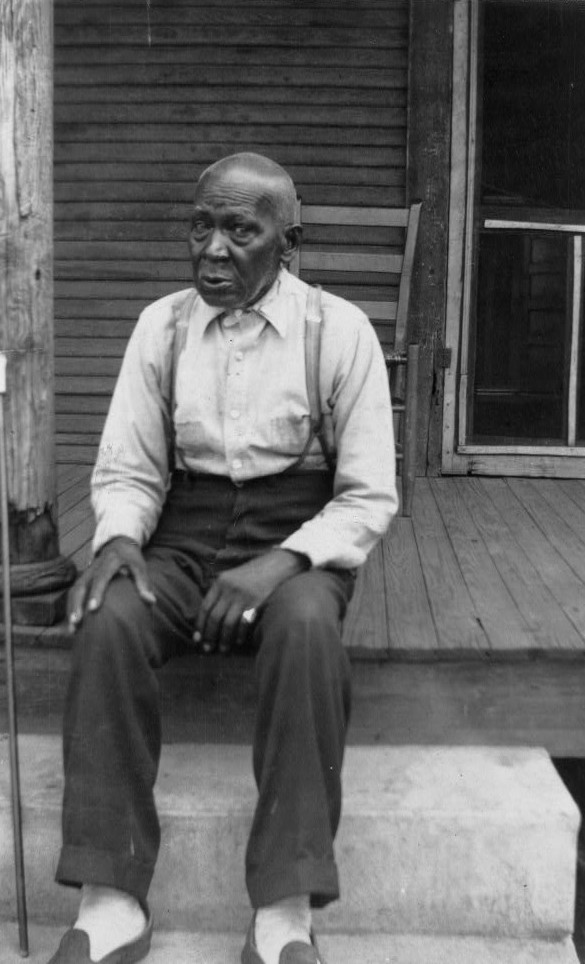
ALABAMA FOOTPRINTS – Volume I – IV: Four Volumes in One
BUY ONE GET ONE FREE! The first four Alabama Footprints books have been combined into one book,
ALABAMA FOOTPRINTS Exploration
ALABAMA FOOTPRINTS Confrontation
From the time of the discovery of America restless, resolute, brave, and adventurous men and women crossed oceans and the wilderness in pursuit of their destiny. Many traveled to what would become the State of Alabama. They followed the Native American trails and their entrance into this area eventually pushed out the Native Americans. Over the years, many of their stories have been lost and/or forgotten. This book (four-books-in-one) reveals the stories published in volumes I-IV of the Alabama Footprints series.


